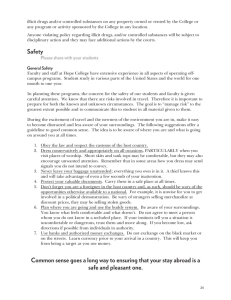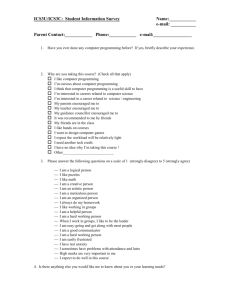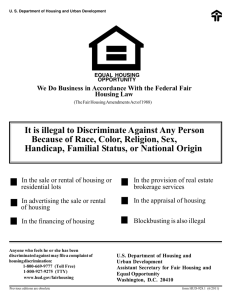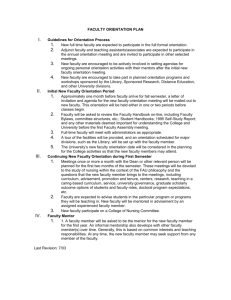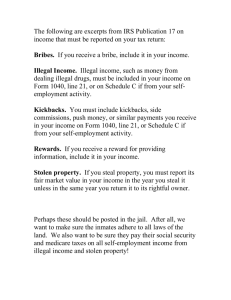The consumption of alcoholic beverages is prohibited at all Hope... not matter where they are located. Faculty members accompanying...
advertisement
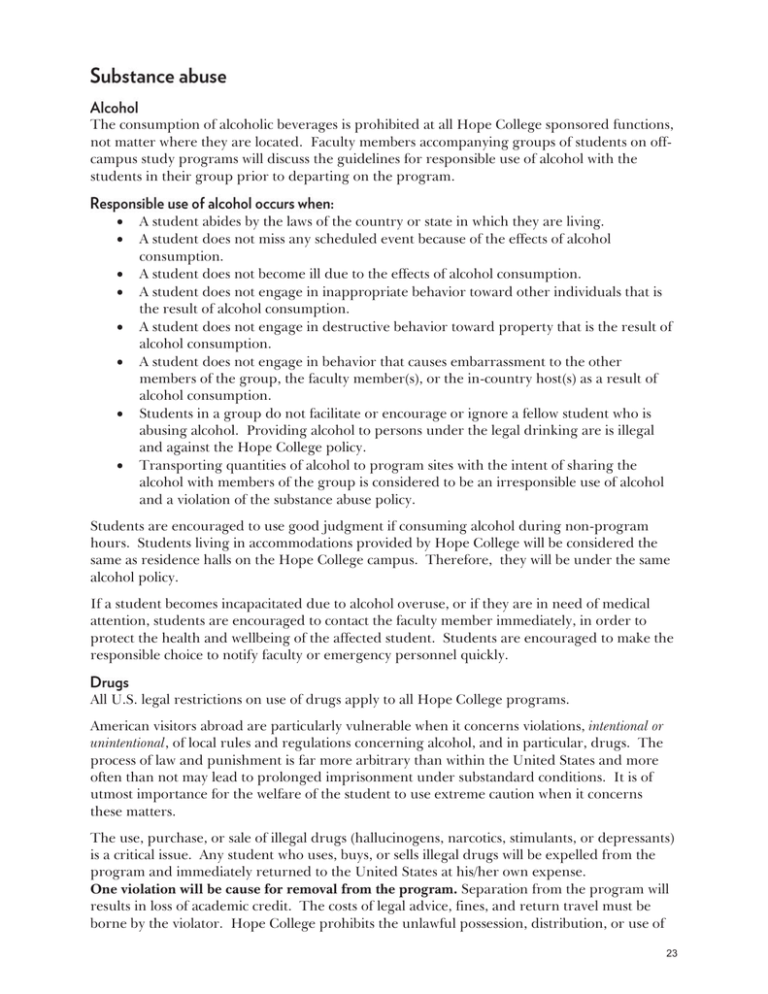
The consumption of alcoholic beverages is prohibited at all Hope College sponsored functions, not matter where they are located. Faculty members accompanying groups of students on offcampus study programs will discuss the guidelines for responsible use of alcohol with the students in their group prior to departing on the program. x x x x x x x x A student abides by the laws of the country or state in which they are living. A student does not miss any scheduled event because of the effects of alcohol consumption. A student does not become ill due to the effects of alcohol consumption. A student does not engage in inappropriate behavior toward other individuals that is the result of alcohol consumption. A student does not engage in destructive behavior toward property that is the result of alcohol consumption. A student does not engage in behavior that causes embarrassment to the other members of the group, the faculty member(s), or the in-country host(s) as a result of alcohol consumption. Students in a group do not facilitate or encourage or ignore a fellow student who is abusing alcohol. Providing alcohol to persons under the legal drinking are is illegal and against the Hope College policy. Transporting quantities of alcohol to program sites with the intent of sharing the alcohol with members of the group is considered to be an irresponsible use of alcohol and a violation of the substance abuse policy. Students are encouraged to use good judgment if consuming alcohol during non-program hours. Students living in accommodations provided by Hope College will be considered the same as residence halls on the Hope College campus. Therefore, they will be under the same alcohol policy. If a student becomes incapacitated due to alcohol overuse, or if they are in need of medical attention, students are encouraged to contact the faculty member immediately, in order to protect the health and wellbeing of the affected student. Students are encouraged to make the responsible choice to notify faculty or emergency personnel quickly. All U.S. legal restrictions on use of drugs apply to all Hope College programs. American visitors abroad are particularly vulnerable when it concerns violations, intentional or unintentional, of local rules and regulations concerning alcohol, and in particular, drugs. The process of law and punishment is far more arbitrary than within the United States and more often than not may lead to prolonged imprisonment under substandard conditions. It is of utmost importance for the welfare of the student to use extreme caution when it concerns these matters. The use, purchase, or sale of illegal drugs (hallucinogens, narcotics, stimulants, or depressants) is a critical issue. Any student who uses, buys, or sells illegal drugs will be expelled from the program and immediately returned to the United States at his/her own expense. One violation will be cause for removal from the program. Separation from the program will results in loss of academic credit. The costs of legal advice, fines, and return travel must be borne by the violator. Hope College prohibits the unlawful possession, distribution, or use of 23 illicit drugs and/or controlled substances on any property owned or rented by the College or any program or activity sponsored by the College in any location. Anyone violating policy regarding illicit drugs, and/or controlled substances will be subject to disciplinary action and they may face additional actions by the courts. Faculty and staff at Hope College have extensive experience in all aspects of operating offcampus programs. Student study in various parts of the United States and the world for one month to one year. In planning these programs, the concern for the safety of our students and faculty is given careful attention. We know that there are risks involved in travel. Therefore it is important to prepare for both the known and unknown circumstances. The goal is to “manage risk” to the greatest extent possible and to communicate this to student in all material given to them. During the excitement of travel and the newness of the environment you are in, make it easy to become distracted and less aware of your surroundings. The following suggestions offer a guideline to good common sense. The idea is to be aware of where you are and what is going on around you at all times. 1. Obey the law and respect the customs of the host country. 2. Dress conservatively and appropriately on all occasions, PARTICULARLY when you visit places of worship. Short skits and tank tops may be comfortable, but they may also encourage unwanted attention. Remember that in some areas how you dress may send signals you do not intend to convey. 3. Never leave your baggage unattended; everything you own is in it. A thief knows this and will take advantage of even a few seconds of your inattention. 4. Protect your valuable documents. Carry these in a safe place at all times. 5. Don’t forget you are a foreigner in the host country and, as such, should be wary of the opportunities otherwise available to a national. For example, it is unwise for you to get involved in a political demonstration. Be wary of strangers selling merchandize at discount prices, they may be selling stolen goods. 6. Plan where you are going and use the buddy system. Be aware of your surroundings. You know what feels comfortable and what doesn’t. Do not agree to meet a person whom you do not know in a secluded place. If your instincts tell you a situation is uncomfortable or dangerous, trust them and move along. If you become lost, ask directions if possible from individuals in authority. 7. Use banks and authorized money exchanges. Do not exchange on the black market or on the streets. Learn currency prior to your arrival in a country. This will keep you from being a target as you use money. 24
